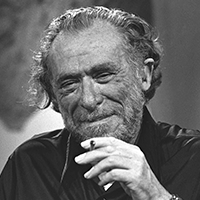Profile of Charles Bukowski
Born : 16 Aug 1920
Died : 09 Mar 1994 | Los Angeles, California
Charles Bukowski, born Heinrich Karl Bukowski in 1920, was an American poet, novelist, and short story writer who carved his own niche in the literary landscape. His writing, often raw and unflinching, delved into the underbelly of Los Angeles, capturing the lives of the downtrodden and marginalized.
Bukowski's childhood was far from idyllic. Born in Germany to an American father and a German mother, he immigrated to the United States at a young age. His father, a strict disciplinarian, instilled a sense of alienation in Bukowski, who often found solace in books. He struggled with acne and bullying, which further fueled his introspective nature.
After dropping out of college, Bukowski embarked on a series of odd jobs, from factory worker to parking lot attendant. He battled alcoholism and depression, experiences that became central themes in his later work. Despite the hardships, he never abandoned his writing, honing his craft in small literary magazines and underground publications.
In 1959, Bukowski's poetry collection, "Longshoreman: 1951-1959," marked a turning point. His blunt, confessional style resonated with readers who saw themselves reflected in his characters. He found further success with the publication of his semi-autobiographical novel, "Ham on Rye," in 1982.
Bukowski's work continues to inspire and challenge readers. His characters, often alter egos named Henry Chinaski, grapple with existential anxieties, societal norms, and the human condition. While some critics dismissed his work as vulgar and nihilistic, others lauded him for his authenticity and unflinching portrayal of the underbelly of American life.

